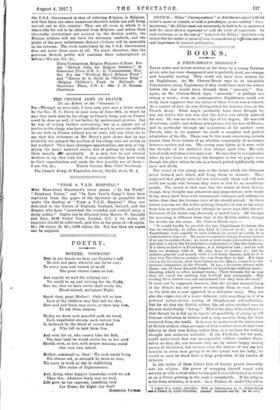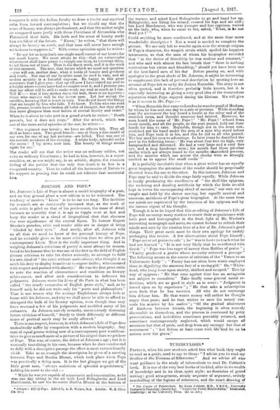BOOKS.
A FRENCHMAN'S MESSAGE.•
Terse notes and letters written at the front by a young Parisian artist, who lies since disappeared and is probably dead, are etrange and beautiful reading They could not have been written by an Englishman. As Mr. Clutton.Brock says in an admirable Introduction, many Englishmen if they could have resit the letters before the war would have thought them "unmanly." But, again, as Mr. Clutton.Brock says, " unmanly " is perhaps too strong a word; even an unimaginative Englishman could not really have supposed that the writer of these letters was a coward. As a matter of fact, lie was distinguished for bravery even in the French Army. What might justifiably have been thought by any one before this war was that the writer we.s utterly unfitted for war. Ho was an artist to the tips of Ida fingers!. Ho was full of nervous], subtle, and delicate perceptions, but for love of France, and in particular through the impiration of Ins mother—very French, this, in its manner—he made a complete and perfect adaptation of his life. There can he few more convincing record, extant than these letters of an absolute community of sentiment between mother and son. The young man fights, as it were, with the thought of his mother's eyes always upon him. His only teat of week well done is her approval. He says that he isle parades° when he sits down to convey his thoughts to her on piper. even though the place where he sits is a trench pelted indifferently with snow and shells.
The secret of this young man is the secret which the Germans never learned, end which will bring them to disaster. They supposed that people who did not continually think and efil wee could not make war because they insist in fact be an unmilitary people. The secret is that men like the writer of these letters, though they thought war abhorrent and preposterous, were reedy to lay down their lives with consununate calmness, and willingness rather than that the German view of life should prevail. In these letters you can see the writer putting thoughts of war as far away from him as possible, and yet (though he never says this) his per- formance of his duties was obviously a sacred trust. All through his reasoning is different from that of the British soldier, though the results are the same. Mr. Outten-Brock says " It would hardly be possible for any Englieliman to ignore the war so resolutely, to refuse any kind uf cement to it ; or, if an Englishman were capable of such refusal, he would probably be a conscientious objector. ‘Ve moist romanticise things to some extent if we are to endure them; we must at least snake jokes about them ; and that is where the French fail to understand us, like the Geniuses. If a thing is bad to a Frenchman, it is altogether bad ; and Ito will have no dealings with it. He mny have to endure it ; but he endures gravely and tensely with a sad Latin dignity, and so it is that this Frenchmen endures the war from first to last. For that reason the Germans, after their failure on the Marne, counted 0:1 the nervous exhaustion of the French. It was a favourite phrase with them—one of those formulse founded on knowledge without under- standing which no often mislead them—Their formula for ua was that we cared for nettling but football and marmalade—But reading these letters one can understand how they were deceived." It must not be supposed, however, Gust the jocular romanticizing of the British has the power to reconcile them to war. Jokes On the field arc a near approach to a defensive irony. They are also the expressions of a brave defiance, with something in it of a personal independence tasting of blasphemous selfesunkiency. But for all that the British solstice, like all other civilized men in the war, is absolutely "feel up." That is the glory of his endurance; that though be is fed up Inc rejects all possibility of giving up till German militarism is broken and a very unclean thing has been removed from the world. It is may to understand the timepieces sef British soldiers when accounts of their conduct seem to represent hilarity an their true feeling rather than as a medium for mahing thought and existence tolerable. If the Pacificist, for his part, could understand that our incomparable coldiers conduct them- selves as they do, not bemuse they are by nature happy among scenes of bloodshed, but become even the horrors of war sea less horrible to them then giving in to the tyrant and the bully, lie would at once be freed from a large proportion of his burden of delusion.
In the writer of these letters love of beauty passes insensibly into his religion. His power of wrapping himself round with serenity as with a cloak when he has gazed on a hill bathed in colour or on a flower growing in the mud is remarkable. If his religion is for from orthodox, it is real. In a Preface H. Andrd Cheveillon
• LW.ra of a Soldier, 1914-1015. With as Introduction by A. ClutIon-Brock and • Prance by Andre Clicyrfaon. Imam: COustable and Co. Kb. 6d. veld compares it with the Indian faculty to draw a tender and mystical calm from inward contemplation ; but we should say that the sense of beauty was always predominant, and that the author might he compared more justly with those Christiana of Alexandria who Piatonized their faith. His faith and his sense of beauty made him confident of the future. "Know," he writes, "that there will always be beauty on earth, and that man will never have enough wickedness to suppress it." With serene optimism again he writes
"Do not let us keephack one single small corner of our hearts for our smell hopes. We must attain to this—that no catastrophe whatsoever shall have power ta cripple our lives, to interrupt them. its set them out of tune. That is the finest work, and it is the work of this moment. The rest, that future which we must not question —you will see, mother dear, what it holds of beauty and goodness and truth. Not one of our faculties must be used in vain, and all useless anxiety is a harmful expense. Be happy in this groat assurance that I give you—that up till now I have raised my soul to a height where events have had no empire over it, and I promise you that my effort will be still to make ready my soul as much as I can.
M— that if fate strikes down the best, there is no injustice those who survive will be the better men. Let her accept the sacrifice, knowing that it is not in vain. You do not know the things that are taught by him who falls. I do know. To him who can read life, present events have broken all habit of thought, but they allow him more glimpses than ever before of eternal beauty and order." When be is about to take part in a grand attack he writes, "Death prevails, but it does not reign." After the attack, which was one of the more awful episodes of the war, lie writes :—
"Our regiment was heroic ; we have no officers left. They all died as brave men. Two good friends—one of them is fine model of my own for one of my last pictures—are killed. That was one of the terrible incidents of the evening. A white body, splendid under the moon ! I lay down near him. The beauty of things awoke again for me."
The reader will see that the writer was no ordinary soldier, not even an ordinary Frenchman ; be had in him, however, in a super- sensitive, or. as one might say, in an artistic, degree, the common feeling of the patriot that the only true death is to live in a conquered country. Thus he called all the harmonies of Nature to his support in pros ing that he could not tolerate that unnatural fate.



























 Previous page
Previous page